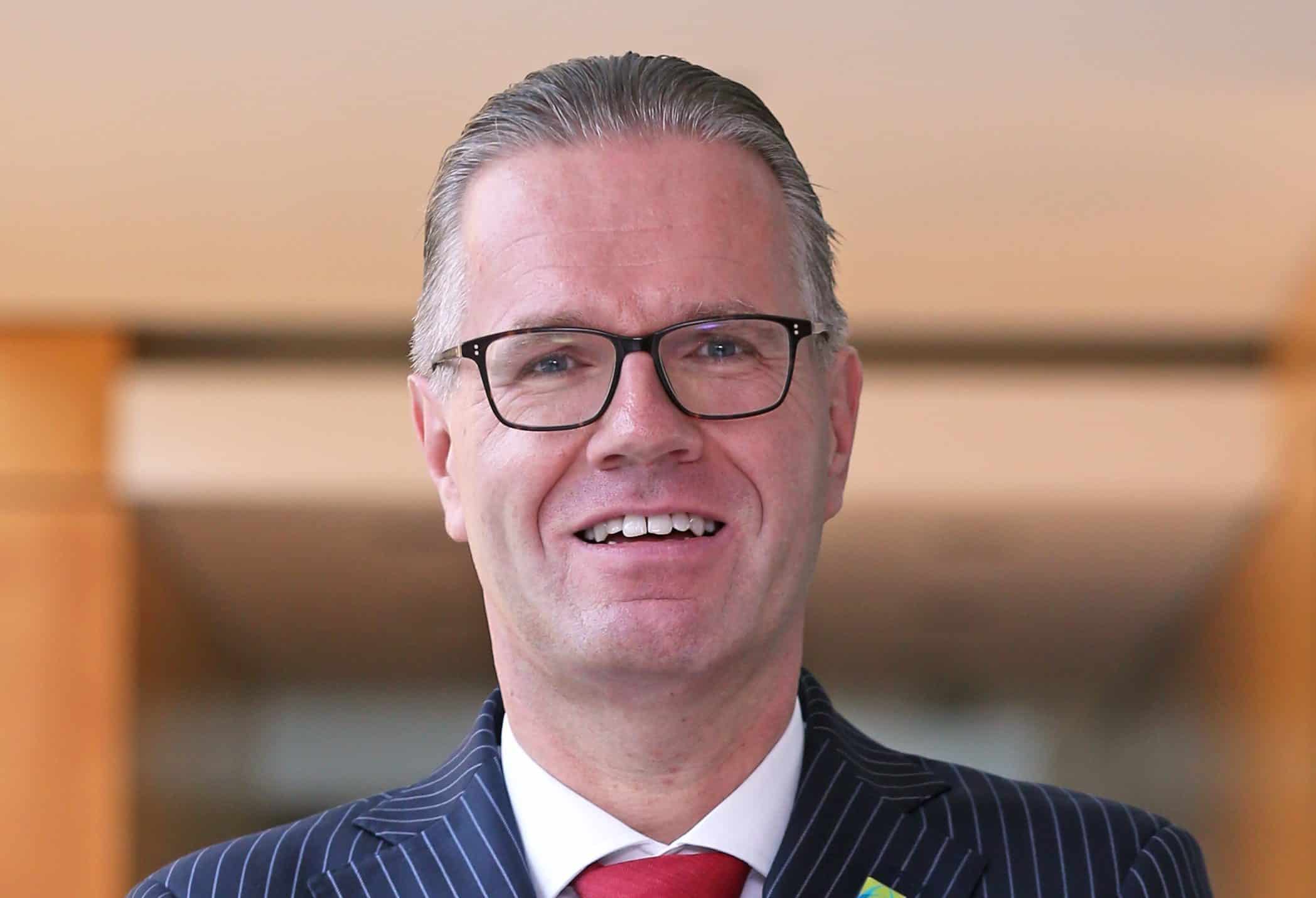The CEO of Commercial Bank of Dubai, Bernd van Linder, started his career at ABN AMRO in the Netherlands before moving to the Gulf Cooperation Council, where he was General Manager of Treasury, Saudi Hollandi Bank, before becoming CEO in 2009.
Dr. Bernd van Linder has a wealth of experience in retail, commercial and corporate banking and an excellent track-record in treasury, risk management and in leading strategic change processes. He is a PhD holder in Artificial Intelligence from the University of Utrecht, Netherlands. He holds also a Master of Business Administration degree in Financial Management from the University of Bradford in the United Kingdom.
In an interview with TRENDS, Dr. Bernd van Linder said that the pace of change and disruptive technological innovations demand that today’s business leaders must not only be consummate in their chosen field but also have leadership qualities.

“Technical knowledge and skills are essential, but are in many ways easier to acquire than leadership and management skills. These have to be gained through a combination of formal and on-the-job training, as well as coaching and mentoring,” he said.
Excerpts from the interview:
What are the main challenges for business leaders today, especially in our region?
For perhaps the first time, I believe that the main challenges facing business leaders today are the same globally. The pandemic was a global leveler and remains the main challenge as we find a way to return to a new normal. In parallel, emerging trends, accelerated pace of change and disruptive innovations and regulatory compliance demands, require that today’s leaders must not only be proficient in their chosen field as they battle the pandemic, but should also have one eye on the medium to long term. The so-called `war for talent’ is probably the biggest challenge facing today’s business leaders. Any business is only as strong as the talent it is able to recruit, develop and retain, and this is especially true for a commoditized service industry such as banking. I am convinced that those businesses that are winners in the war for talent will be winners in their industry segment.
How business leadership has evolved in the pre and post-digital world?
Although I have always been a firm believer in participative leadership, it is clear to me that business leadership is now less hierarchical and involves even more participation, involvement and contribution from everyone. Leaders have also adapted to become more agile and quick in their decision-making process to deal with sudden changes and ensure that organisations don’t fall short in meeting the evolving needs of the customer. The speed at which initiatives are executed is in many ways one of the key differentiators between success and failure in the digital economy. Time consuming and capital intensive projects are being replaced with smaller sprints and MVP launches to ensure that organisations continue to stay close to the customer and meet customers’ needs quickly and fully. The other interesting aspect of a post digital company is that it is no longer the case that those with the longest tenure or the most experience in the company are best equipped to deal with the requirements of today’s customers. This further emphasises the need for increasingly participative decision making and leadership.
What business leaders should do to push for innovation in their teams and young Arab leaders?
To drive innovation, one of the key measures that leaders need to focus on is to encourage employees to take risks without the fear of failure. To be truly innovative, you have to be willing to experiment and actually fail a few times before getting it right. Leading business leaders have already embraced this approach by paying attention to the role of failure in fostering innovation.
CBD too has been on a relentless innovation journey and our recent establishment of a Digital Lab at the DIFC Innovation Hub – the first of its kind initiative by a bank to establish an R&D facility at DIFC, is a natural progression in this endeavour to create a collaborative ecosystem in the FinTech sector. We have had much success in the area of innovation through fostering innovation and supporting integration between financial institutions and FinTech start-ups.
At CBD, we also encourage employees to think creatively and submit their innovation ideas through our annual CBD Innovation Challenge. The Challenge is part of our vision to create a high performing culture and be the best bank in the UAE for our customers. The bank has implemented several of the award winning ideas over the last few years, demonstrating its commitment and backing to the contributions of our employees.
Is it necessary for a CEO to have a technology background? Why?
I don’t think it’s necessary for all CEOs across organisations to have a technology background. However, it is imperative that all CEO’s understand and are open to technology, are learning and evolving from technology and realize the significance it can play to take their organisations to the next level.
CEO’s need to be able to challenge their CTO and CIO, and to be comfortable to have in-depth conversations with a certain level of technical complexity. Today, technology has become integrated with almost every aspect of the business and impacts everything the organization does from sales to operations and administration to marketing. It is therefore imperative that the CEO drives the technology and technology transformation.
Digitally savvy CEOs are able to play a bigger role in changing the organization’s culture to be more agile and open to new technologies and processes. They can act as change agents to influence their employees in the way they think and work.
What are the major changes and trends you see in your industry in the next five years?
The financial sector landscape is changing dramatically as a result of technological disruption, emergence of new players – both fintechs and digital giants – as well as constantly evolving customer expectations.
Banks that continue to improve their digital offerings will earn their place to compete in the market, while those who do not, will be rendered obsolete.
Data will continue to be key in the coming years. Analytics can help banks find new business models and provide more personalized customer offerings. Banks have enormous amounts of data which they get through ATM deposits/withdrawals, point-of-sale purchases, online payments, loans and others, but they have not so far been very good at utilizing these vast data sets. I have heard one commentator describe banks as data rich but insights poor. As data analytics technologies advance, banks should look at using customer behaviour to tailor product recommendations or offer insights on customer’s money habits. Even interest rates and credit limits can be decided upon this data.
What steps would you recommend for building a strong GCC human capital?
As I mentioned above, a company is only as strong as its talent, and in order for organizations to thrive, they need to establish a diverse team of leaders who have the passion and enthusiasm to help the organization grow.
I would say the first step for building strong Arab Human Capital and future leaders is to provide them with opportunities to broadly develop themselves. This should be done through structured mentoring and training programs, which will provide them with the knowledge and skills they require to groom them for future leadership roles. Technical knowledge and skills are essential, but are in many ways easier to acquire than leadership and management skills. These have to be gained through a combination of formal and on-the-job training, as well as coaching and mentoring.
At CBD, we have a range of programs for UAE national talent, from the Tumoo7 Management trainee program for new recruits, to the UAE Accelerator Program targeting mid-career professionals as well as offering financial support for higher education to UAE nationals.








